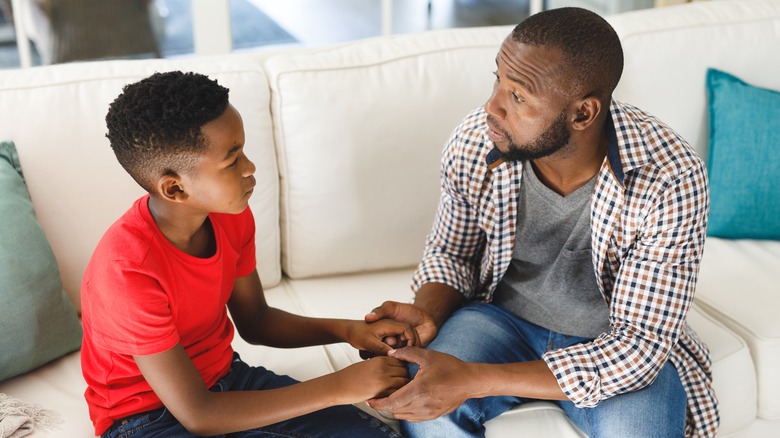A Sexologist's Guide To Talking About Sex With Your Kids - Exclusive
Whether it was with a clearly uncomfortable parent telling you to use protection, an underqualified teacher giving the class a "Mean Girls" style abstinence-only lecture, or an equally ignorant friend sharing what they overheard their older sibling say, we can all look back on our teenage years and remember an uncomfortable conversation about sex.
These exchanges were often equally confusing, leaving us with more questions than answers and sometimes blatantly wrong information. In addition to the misinformation young people have always learned for their peers, modern day kids also turn to the internet and media to form ideas about sex, much of which can be innately harmful (per Psychology Today).
With the U.S. being the highest ranking developed nation in terms of teenage pregnancy and sexually transmitted diseases and infections as of 2019 (per Social Strategy Network), it's clear to see how the misinformation and ignorance surrounding sex can affect a person's health and individual wellbeing.
While much can be said about the sexual education provided in American schools, it's also important that parents and caregivers take the initiative to talk with their own children about sex. We all know from experience how awkward these discussion can be, but thankfully, expert Jess O'Reilly, sexologist and host of the "Sex with Dr. Jess" podcast, has shared expert advice on how to talk to your kids about sex.
Discussing sex-related topics early on will help your kids in the future
According to sexologist and podcaster Jess O'Reilly, a major tip for talking to kids about sex is taking the initiative to start conversations at an early age. This can seem like a challenging task, but O'Reilly mentions using accurate terms for body parts as a great starting point, saying, "you might explain to them what you're [doing] when you're washing them (e.g. I'm wiping down your vulva — the vulva includes the parts on the outside between your legs)."
As explained by Better Help Channel, this will give your child the vocabulary needed to ask questions or report something wrong. It will also help them avoid feeling any shame or awkwardness about their body. Starting early is also a way to help parents become more comfortable with these conversations, as O'Reilly adds that practicing with your baby-aged child will help you get used to saying body-related terms aloud.
Consent is also a concept that can be introduced to kids. "This is a non-sexual skill that is transferable to sexual relationships when they're older," says O'Reilly. "Make sure they know that they can make decisions about their body. For example, ask them if they want a hug or a kiss before diving in. Let them know that they can say no and respect their boundaries."
Providing them with boundary-setting language is an important element of teaching consent, as they should be able to decline offers for hugs and kisses without pressure.
Be open to answering questions
Another tip for talking about sex with your kids is being open to questions, something you should remind your kids of regularly. As mentioned by Jess O'Reilly, dismissing a child's sex-related questions can cause them to turn to their peers or the internet instead. She says, "When they ask a question, validate their inquiry and give an age appropriate answer ... Let them know that it's normal to be curious."
O'Reilly also says that it's okay to not have all the answers right away, and suggests giving honest answers like "I don't have the full answer, but I'm going to get right back to you." Or, "I'm curious about that too. Let's look it up together at Amaze.org."
Using resources to supplement your own knowledge is a suggestion that is echoed by Better Help Channel, as they mention the benefits of online resources and visual aids. With this, it's important that you use accurate resources to ensure you're sharing reliable information.
Lastly, O'Reilly emphasizes that discussions about sex is an ongoing thing, saying, "Let them know that the conversation doesn't end there. You can always come back to me if you have more questions. It's a big topic."
As explained by Center for Parent and Teen Communication, the casual nature of an ongoing conversation will make your teens feel more open to approaching such topics, whereas reacting to an event or prefacing a notable occasion with "the talk" can make your children feel awkward and less receptive.


